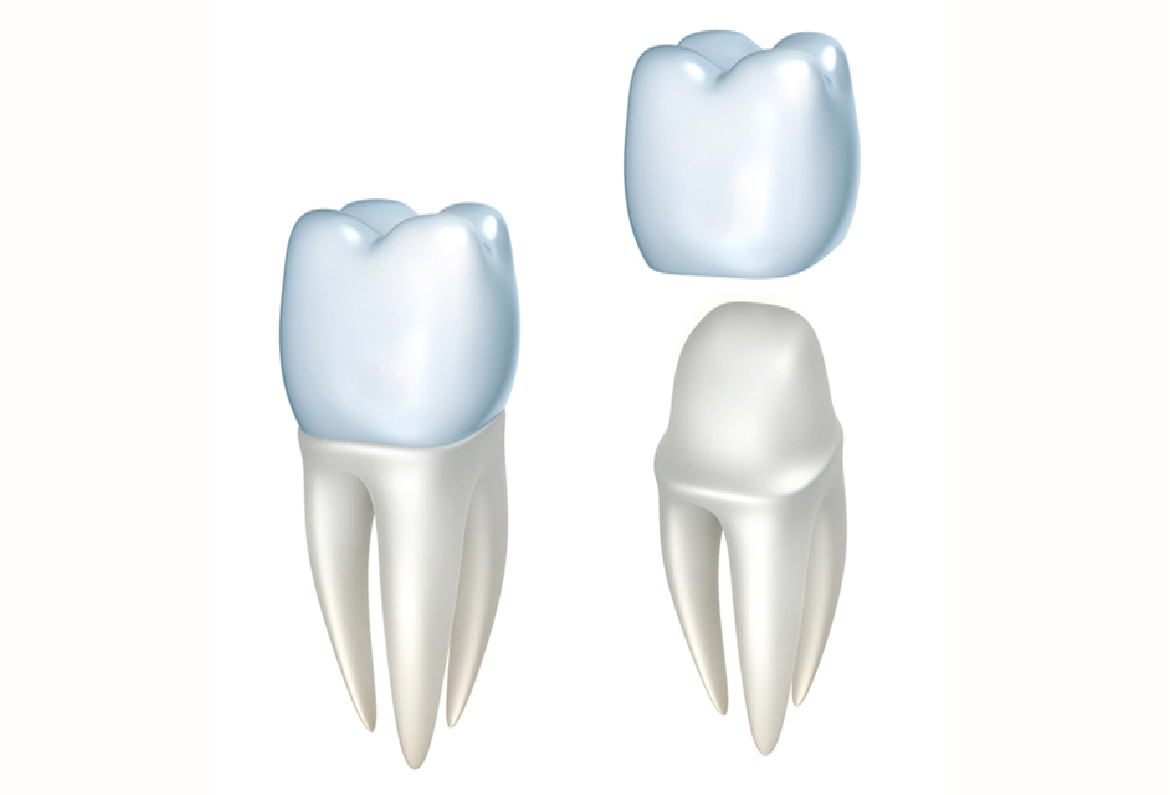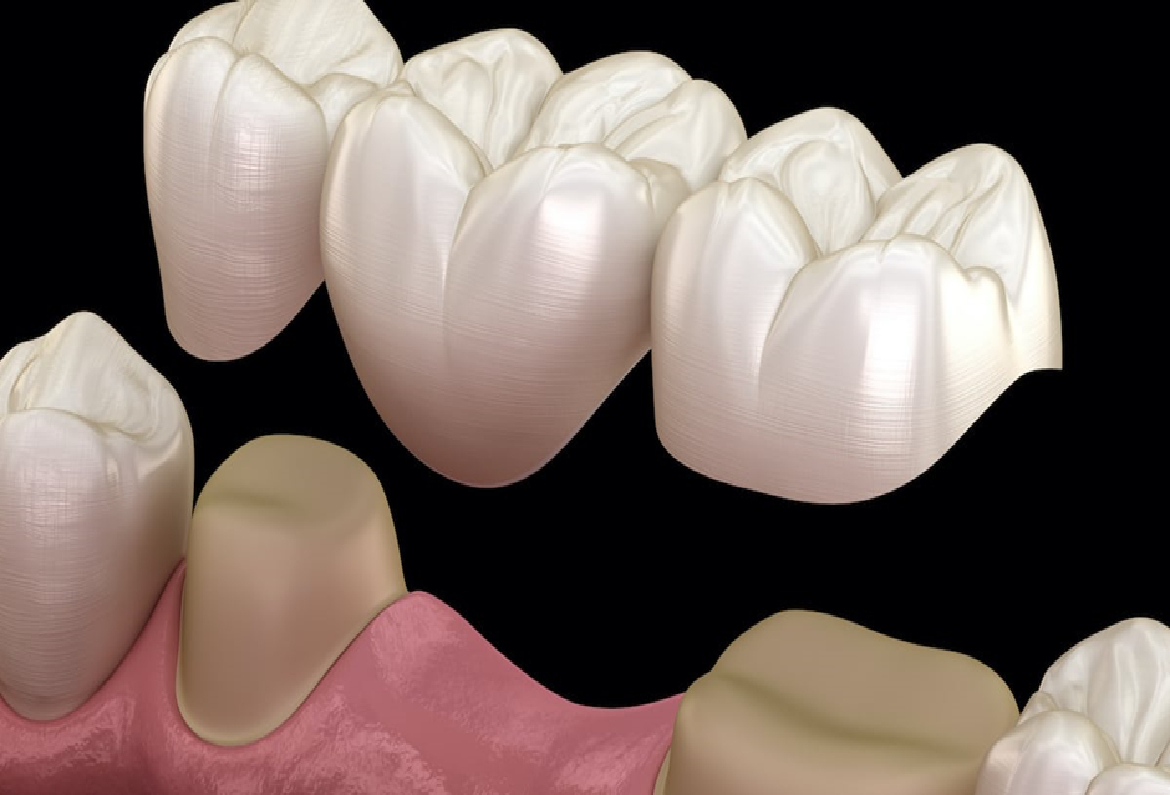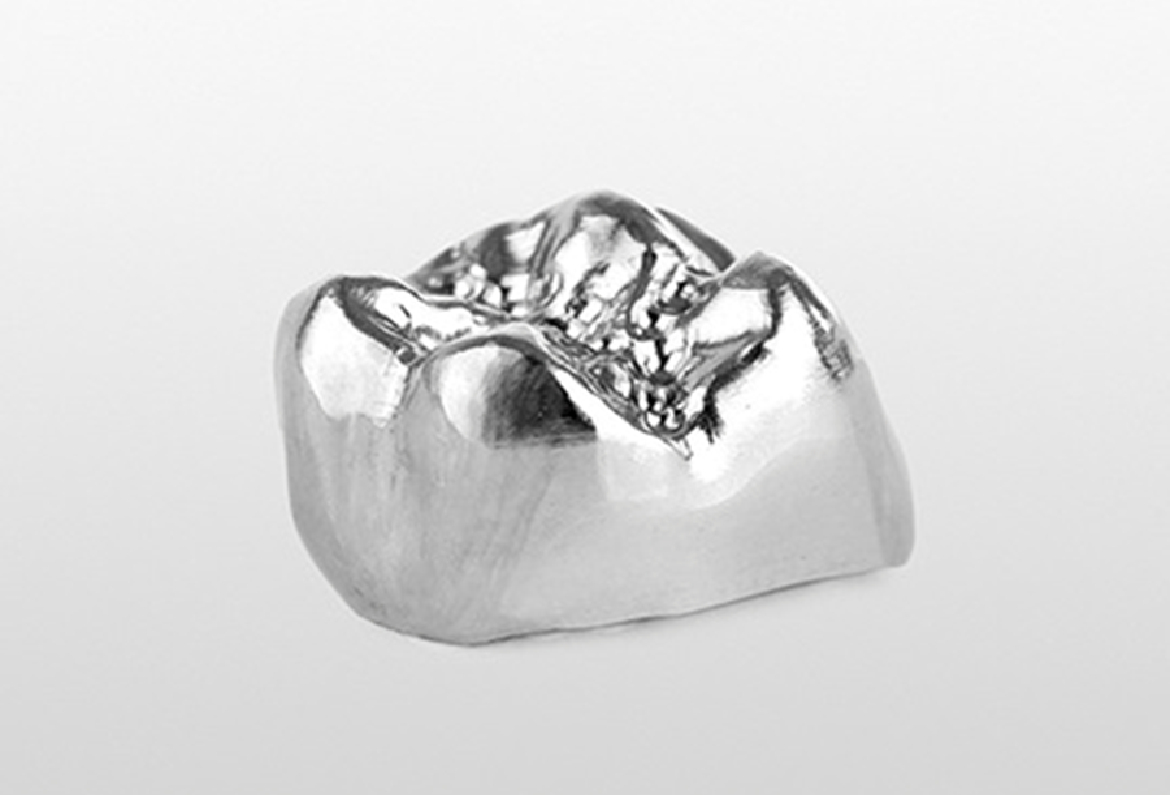- kalpvrikshadentoimplant@gmail.com
- +91 9329378883
- Mon to Sat: 8:00 AM to 9:00 PM | Sun: Closed
☛ Crowns (caps) are used to cover teeth that are weakened by decay, severely damaged, chipped or discoloured. Crowns are frequently on teeth required after root canal therapy on molars on premolars to protect them from the fracture. The tooth is shaped to support the crown. Crowns can be metallic or metal-free. The advantage of metal free crowns, such as Zirconia and E.max, are the masking of the grey hue on the gum line caused by the silver coloured metal. In certain situations, computer technology is also utilized to fabricate these metal free restorations at Kalpvriksha Dental.
☛ A crown is a cap or covering for an existing tooth. Typically, a crown covers the entire tooth and protects the inner tooth structure from damage.

☛ A bridge is 3 or more joined crowns. In it's simplest form, when there is a missing space between teeth, two teeth on either side of the missing space are utilized to make a 3 unit bridge. The missing tooth is replaced by obtaining support from the adjacent teeth on either side of the missing space.

☛ A crown is usually needed when the amount of missing or damaged tooth structure is substantial. A crown may also be necessary when a tooth has been root canal treated. The Kalpvriksha Dental team will advise you if a crown is necessary after discussing your dental needs, performing a thorough clinical examination and taking relevant xrays to arrive at a diagnosis.
☛ A bridge is preferred to other options, such as dental implants, when all or some following criteria are met:
☛ Composite fillings are a great option for small cavities and gaps. When these become large, however, these fillings may not be very successful in the long term. Gaps between teeth tend to open up when they involve large fillings. Very large fillings also have a very good chance of fracturing without warning. This is because the filling is heavily dependent on the tooth structure supporting it, and if that tooth structure is compromised in anyway, then the filling will not be very durable.
☛ The need for a crown or a bridge is determined at your consultation appointment. Following this, a 30-45 minute appointment is scheduled to prepare the tooth and take the measurement for the crown. A temporary crown is then placed to protect the tooth while the laboratory makes your new crown.
☛ Yes, absolutely. Your dentist and laboratory technician will work together to ensure that a perfect colour match is obtained to your existing teeth. Most patients and their families are unable to differentiate it.
☛ Kalpvriksha Dental uses the latest in bonding technology to ensure a very reliable, long term fit of the crown. In rare instances, a crown may start to work loose, and can be recemented quite easily in a short procedure. This is a very uncommon occurrence, but do take care to save the crown or bridge and bring it back to us so we can recement it to your tooth.
☛ After cementation of the crown, depending on the type of cement used, your dentist at Kalpvriksha Dental may advise to wait 30 minutes before eating or drinking. Some cements do not have this restriction, and you can use the crown or bridge right away.
☛ Crowns and bridges do not have an expiration date. With proper maintenance, we have many patients who have had these restorations in their mouths for many years. Typically, a crown or bridge may need to be replaced for the following reasons:
☛ A checkup every 6 months with the Kalpvriksha Dental team is advised to ensure that the restoration is in good shape. Small issues with these restorations can easily be fixed and this is why the six monthly checkup is very essential. On average, the average patient has a crown or bridge in the mouth for 7-10 years before they need to be replaced.
☛ There are multiple options available to make the perfect crown. All these materials have their place, and there is no "best" material. The same materials are used to make a bridge as well.
Metal: This is the traditional crown, and is usually silver in colour. Gold crowns are also an option in this category. These crowns appear artificial as they do not have any ceramic on them. They have very high strength and are used when there is insufficient space available between the upper and lower teeth to add ceramic to the crown.
Metal-Ceramic: This is perhaps the most commonly used material worldwide. In this type of crown, ceramic is baked over the metal to make the crown look like a natural tooth.
The metal is made of cobalt-chromium or platinum-palladium metals. These are great solutions for back teeth because of their strength. More esthetic options exist for front teeth these days, so a metal ceramic crown is not the first choice for the Acharya Dental team when it comes to restoring front teeth.

Zirconia: Zirconia crowns are fast rising in popularity these days. Zirconia is actually a "transition metal" in the same family as titanium, but is marketed as "metal free" due to the fact that it is white in colour. Zirconia is extremely safe to use in the human body. The white colour of zirconia has esthetic advantages, so we recommend this solution for front teeth, and back teeth when high strength is desired.
Emax: Emax is a brand of ceramic, and chemically is Lithium DiSilicate. These crowns are the most esthetic solution available in dentistry today. They are used extensively in front teeth by the Kalpvriksha Dental team, especially when a perfect match to natural teeth is needed. They are not extremely strong, so they are not used in certain situations such as a bridge for the back teeth.
☛ A crown is cared for in the same way as a tooth; regular brushing and flossing is all you need to do. A bridge may require a waterpik or a bridge floss to clean under the bridge. Your dentist at Kalpvriksha Dental will guide you on the best way to keep your beautiful restoration squeaky clean. As always, a 6 month professional dental checkup is the best way to ensure you investment is protected for a long time to come.